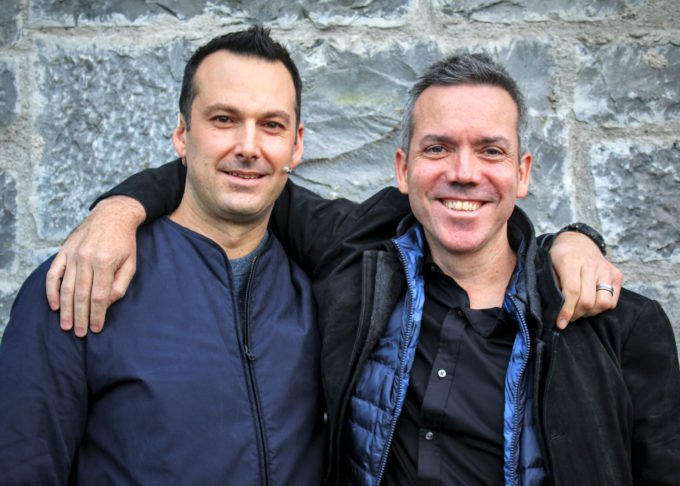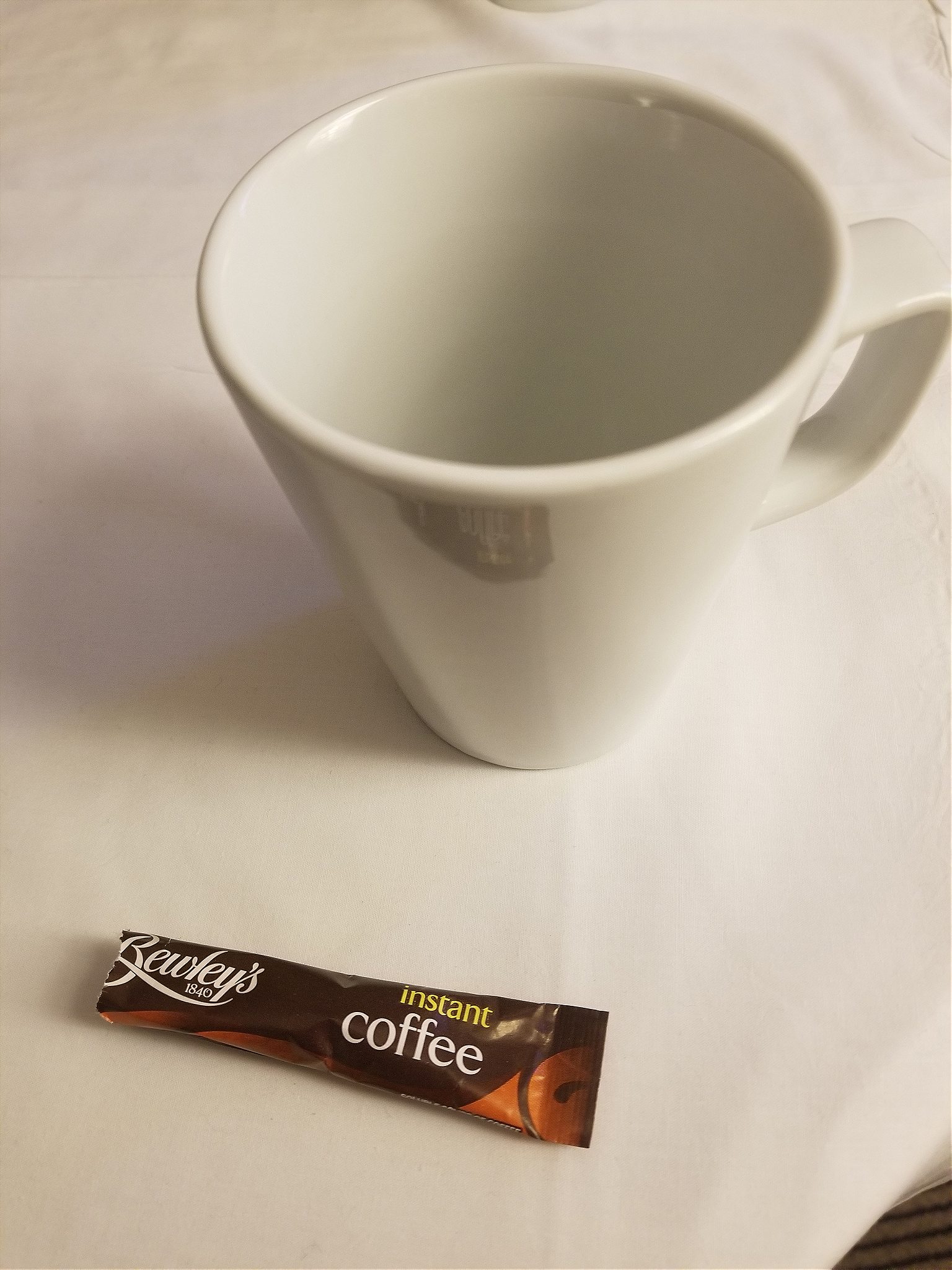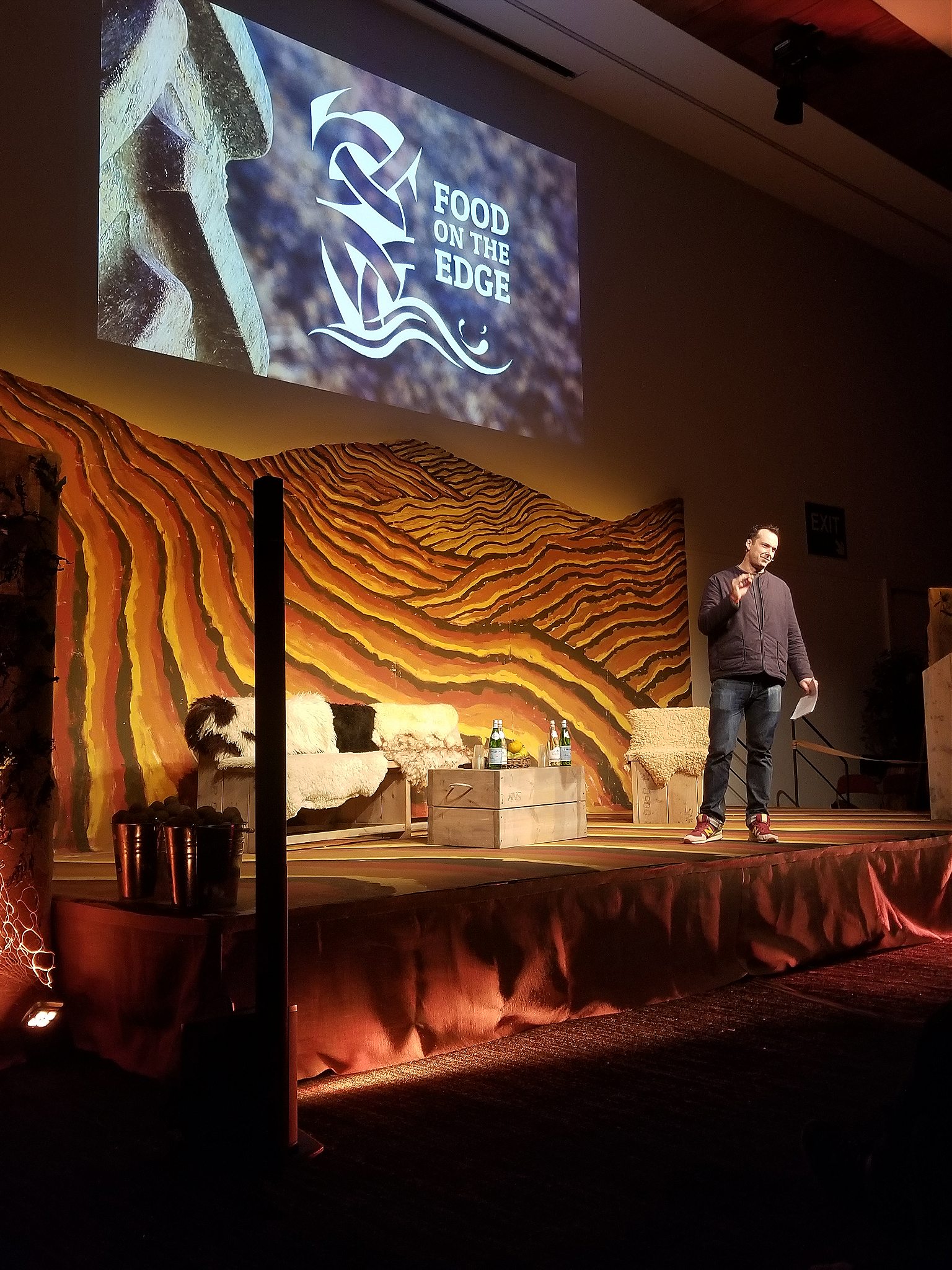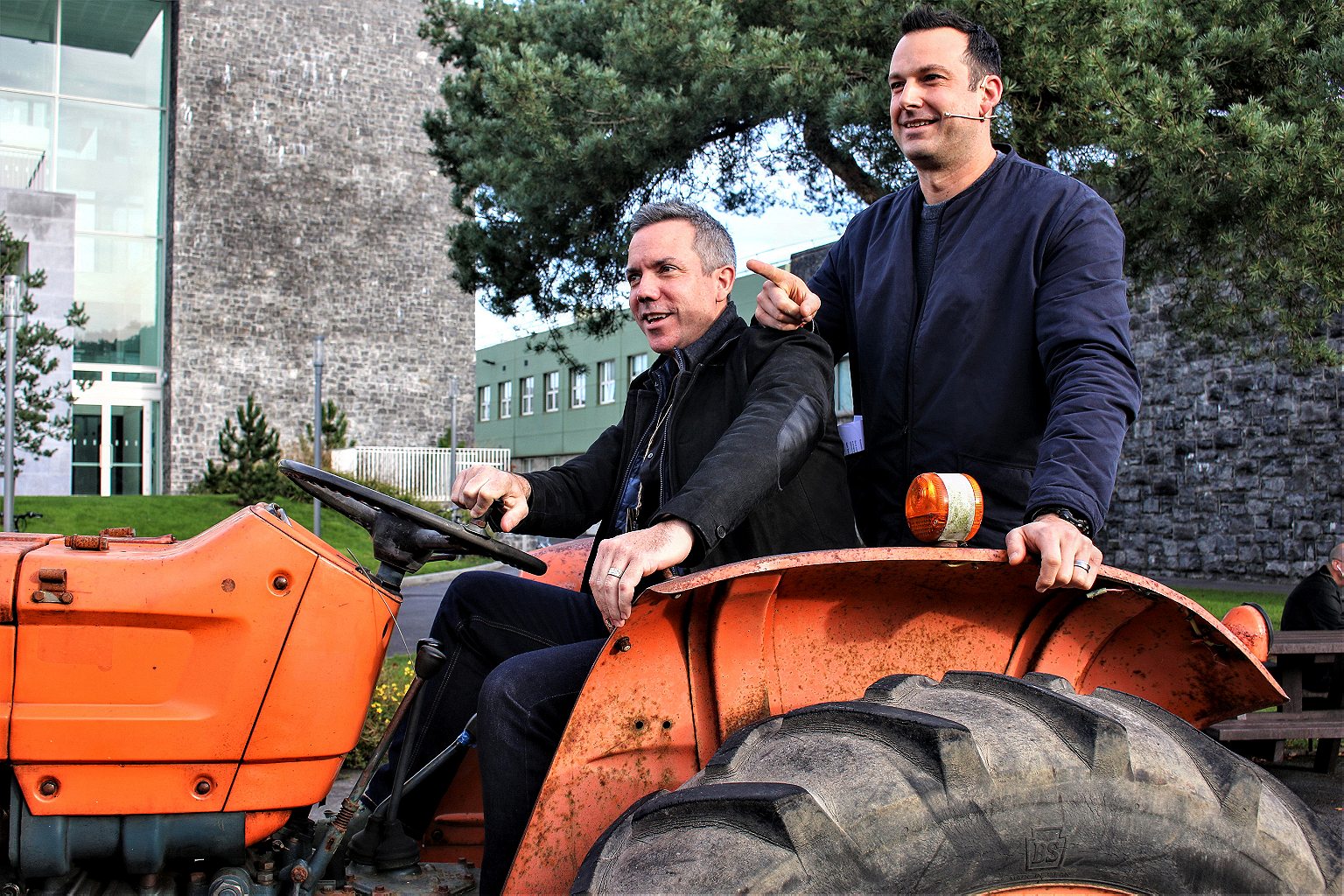
Instant coffee in Galway with Matt Orlando

Nathan Thornburgh and star chef Matt Orlando of Amass Restaurant drink lousy instant coffee in Galway and talk about running a true zero-waste kitchen in the age of greenwashing.
Matt Orlando has worked at some of the great restaurants on this planet. Per Se in New York; The Fat Duck in the UK; Noma in Copenhagen, where he was head chef under Rene Redzepi. But it wasn’t until he opened his own restaurant Amass—and looked in his own dumpster actually—that he found his true calling. As you’ll see in this episode, his vision for a zero-waste restaurant is idealistic, inspiring, and is somehow also super delicious. Nathan sat down with him in Galway—the final of this podcast’s guests from Food on the Edge this fall—at a very early hour and drank instant coffee with him. Because, you know, world-class chefs demand a hot cup of Bewley’s coffee crystals.
Here is an edited and condensed version of the transcript from Nathan’s conversation with Matt. You can listen to the full episode, for free, on Apple Podcasts, Stitcher, Spotify, or wherever you get your podcasts.
Matt Orlando: I’m ready for the whole instant coffee experience.
Nathan Thornburgh: That’s perfect. You went downstairs and had breakfast without coffee.
Orlando: Exactly. It was the responsible thing to do.
Thornburgh: What are we looking at here?
Orlando: Bewleys? Well, they must be some quality. They’ve been around since 1840.
Thornburgh: I’m here with Matt Orlando, a world-famous chef, who’s going to tell me whether you put instant coffee at the bottom of the cup first or water first.
Orlando: Well, there’s the old rule in pastry: you always add your wet to your dry. I’m going to stick with that one.
Thornburgh: Always add your wet to your dry…
Orlando: No, no! Sorry.
Thornburgh: Oh, shit. Do we have to do this again?
Orlando: You’re right. That’s right. I said that right. See what happens if I don’t drink coffee and we try to have an intelligent conversation?
Thornburgh: We’re here for Food on the Edge, which is a high-caliber food conference, convention of the Food Illuminati. They’re just feeding us this ridiculous organic soda bread, and everything’s plucked fresh from the sea. And yet, JP is going to love the fact that I found the one extremely shitty thing that has been put in front of me.
Orlando: It’s really hot. I don’t think I’m going to be able to give you any tasting notes after that drink.
Thornburgh: In 2018, chef Matt Orlando suffered a career-ending instant coffee burn.
Orlando: Third-degree tongue burn.
Thornburgh: It won’t end your career. You’ll be like Beethoven when he was deaf, you know? You’ll be the chef who couldn’t taste.
Orlando: I’ll taste with my ears. You, if you go drink really good coffee, you should actually let it cool down to get all the floral and the acidic notes on it.
Thornburgh: Oh really? The real Bewley’s magic will bloom. All right, so you’re here at Food on the Edge for what reason?
Orlando: I’m here. I’ve been here every year since they started Food on the Edge. This year, I actually get to emcee.
Thornburgh: I love how we’re starting your big day of talking with a bunch of talking.
Orlando: To get me warmed up. It’s fine. Yeah, it’s better than me talking to myself in the mirror.
Thornburgh: What do you have to do as an emcee at a food conference?
Orlando: Actually, I was a bit stressed out about because I’ve never done this before, so I researched every single person that I’m introducing because you have to be able to introduce them in under 20 seconds and to not say their name until right before they come on stage.
Thornburgh: Oh, right.
Orlando: It’s a bit of an art form.
Thornburgh: That’s interesting. So, the last time I was at your restaurant, Amass, we just had like a super lightning tour of the menu and it’s a very special thing you’re doing. So what’s going on there now?
Orlando: We’re five years in and we are in a very different place now. I think the biggest thing is the frame of mind that we have now—from the creative process of the food, to how we’re sourcing our ingredients, to how we’re treating the ingredients most of all. When I say treating the ingredients, that’s just paying attention to the entire ingredient. This is paying respect to the entire ingredient. Sometimes, to use the ingredient you have to put certain parts of it, i.e. the byproducts of the ingredient, through certain processes. Those processes often yield a more delicious flavor than the actual main part of the ingredient itself. And I think that the thought process has now started to affect the creative process, whereas we are processing all these so-called byproducts into delicious things and then storing them and then using that as the starting point for our dishes. For example, we take all the stems of kale, add two percent salt to them. Let them sit for four or five days in a warm room, dry them out, ground into a powder and it tastes like seaweed.

Thornburgh: So you just carry a little baggie of this stuff? I’ve got a little coke spoon. We can use it.
Orlando: Seaweed bumps. Kale stem bumps.
Thornburgh: Man, JP’s going to kick your ass if you came to the land of, what is it called? Dill. Dill. Dillisk. They’ve got like this very special seaweed out here that he’s really high on.
Orlando: Oh really?
Thornburgh: And you’ve brought the kale replacement.
Orlando: I used it in the master class yesterday. I think I convinced half the population of Galway to stop eating seaweed. Just process kale stems.
Thornburgh: The crestfallen seaweed vendors outside the hall.
Orlando: It much cheaper and much less expensive. Helps your food cost. I think I might actually some for us to try. Let me check.
Thornburgh: So, I had this question about Ayahuasca, which is this sort of like an impossible combination of the leaves of this plant over here with the resin of this other plant and then somebody put it together. The question that I have—I’m just like such a nerd about this and I should just sit back and enjoy the demons, but instead I’m like who is the guy who figured this out? Who was the first person to brew these leaves with this resin? And you’re kind of embarking on a dozen different paths like that in a single dinner for somebody.
Do you just have so many attempts that have gone horribly wrong?
Orlando: I would say that some of the stuff that we have consumed in the kitchen in the name of science have been less than delicious.
Thornburgh: Do you have like rules like if you came up with the dish, you have to be the first guy to taste it?
Orlando: Generally, if you thought it up, you’re going to be the first one to make it and the first one to taste it. Every once in a while, someone will come to me and say, “Chef, taste this,” and I’m like, have you tasted it? They’re like, “no,” And I’m like, why not?
Thornburgh: That’s excellent.
Orlando: I want to know who was the first person that ate a fucking sea cucumber.
Thornburgh: That is also a good question. Here’s a thing that’s writhing in your hand,
Orlando: Pulsating and a little bit slimy…
Thornburgh: It’s like a bad bowel movement that has come to life.
Orlando: Every time I’m afraid to taste something, I just tell myself that someone ate a sea cucumber for the first time. You can do this.
Thornburgh: Heroes have walked before me. That’s awesome. So what do you do with this powder? You now have a flavor that you can be pretty damn sure nobody else has.
Orlando: We can turn it into a paste and then dry it. Then we’ll just kind of break pieces of it over a dish.
Thornburgh: Wow.
Orlando: You can also take this and make an oil out of it that’s super delicious. Just blend it into oil and let it sit overnight. Or you can just keep it in powder form and dust stuff with it.
Thornburgh: This is pretty powerful shit. I’m not sure I should fill up on this.

Orlando: It’s actually quite good for you.
Thornburgh: I’m sure.
Orlando: Good for the flora in your gut.
Thornburgh: I would hope and imagine this is probably why you’re carrying around a little baggie or Tupperware of this stuff. So, sustainability is a squishy word and something that is easily co-opted by a lot of people. but just taking a walk through your garden and going through some of the processes you use to run your restaurant—it’s like fuck, this guy is taking this really far. It’s very unreasonable.
Orlando: You said sustainability is a kind of a squishy word. At this point, I don’t even like to use the word. It’s become like “organic,” and we are an organic-certified restaurant as well.
Thornburgh: Right.
Orlando: It’s almost to a point where as soon as the mainstream starts to use the word for something other than what it really should be used for, you just need to move on from it. Because suddenly, you get pigeon-holed in this kind of green-washed society that’s really becoming prevalent now, especially in the restaurant industry. The amount of kind of more high end, well-known restaurants out there that are just blatantly greenwashing themselves right now is it makes me want to vomit in my mouth.
Thornburgh: Just recycle that shit.
Orlando: People will just throw a word like hashtag sustainability in there, or whatever, and everyone freaks the fuck out. Everyone’s like, “oh my God, you’re so responsible. You’re setting an example for the industry.” Come on, bro.
Thornburgh: Just go take a look at that man’s dumpster. Is that where the rubber hits the road for you? What defines your baseline commitment so you’re not out there co-opting?
Orlando: You don’t have to talk about it. Just do it.
Thornburgh: Number one: hashtags need not apply.
Orlando: For so long, we were as a team at the restaurant trying to figure out a way to communicate what we were doing without preaching because as soon as you preach, they give the 50-yard stare. We worked so hard to figure out how to try to communicate this and without using the words sustainable or organic because as soon as you say those words, people think, “oh, they’re like that restaurant or that restaurant.” The word that I like to use is responsible because we are a responsible restaurant.
Thornburgh: That’s just straight up, grown-up adulting.
Orlando: That’s it.
Thornburgh: Was there some moment when you were the head chef at Noma or worked at Fat Duck or Per Se when you saw a dumpster full of food that could have been served?
Orlando: I think there were numerous moments throughout my career that I saw situations like that, but I didn’t realize how heavy it weighed on me until I actually had my own restaurant. When we opened the restaurant, we didn’t open with the state of mind we have now. I remember six months after we first opened, we had our first closure for the holidays. It was the first time I was able to kind of take a step back from the restaurant and look at it from the outside and examine everything we were doing inside the restaurant. The thing that kept weighing on me was that we were becoming the kind of restaurant that I used to work at that.
I was by our dumpster and there were leftover potato bread and a few lettuce leaves and stuff and all of these memories of these different experiences from my whole career just came racing back. Interestingly, I was sitting in the restaurant’s garden a couple of days later with a friend and she asked me what the plan was for Amass now we had made it past six months. My response was to be responsible.
Orlando: And she goes, “what does that mean?” And I was like, I have no fucking clue.
Thornburgh: Put it on the whiteboard.
Orlando: Put it on the whiteboard, circle it, and start drawing octopus arms. What can we do to be responsible? A few days before we opened, I sat down with the staff and told them to forget all the stuff we had accomplished over the last six months. We’re doing this now. And they’re like, “what does that mean?” I was like, I have no idea, but this is how we’re going to move forward with this restaurant. And none of us have worked at a restaurant like this. None of us have any reference point to a restaurant like this, but you know what? We’re just going to figure it out and do it on our own, rather than hire a consulting company.
It has allowed us to, I think, succeed a bit more in what we’re trying to do. We didn’t have someone telling us, “do this and do that and do this.” We just kind of organically figured it out. We made a lot of mistakes and probably lost a lot of money while making those mistakes.

Thornburgh: The margin for any restaurant, even a successful one, has got to be so thin. How are you going to sit there and say, you know, now let’s put a guy on the job of a rescuing and upcycling Kale stems?
Orlando: Yeah. Well, a big part of it was that we couldn’t afford to hire more staff so we had to logistically figure it out with what we had.
Thornburgh: How many seats do you have at Amass?
Orlando: Sixty four.
Thornburgh: Sixty four. It’s larger than a lot of restaurants, but it’s also a small laboratory. How do you measure the impact that you have? It’s not by the metric ton of kale stems that you’re not throwing away, right? It’s got to be more about the ideas that could be passed on down the chain.
Orlando: I mean it does come down to the fact that we want to have an impact on the restaurant industry after we’re gone. We want to have an impact on the way people think about cooking.
There’s a guy named West Jackson, who started the Land Institute. He has a quote that I have written in all my notebooks. It says, “If you can measure your life’s work within your own lifetime, you’re not thinking big enough.”
Thornburgh: That is either like an amazing call to service or just like the best fucking sit-on-the-couch excuse. So, tell me where you are taking Amass next?
Orlando: We’re at the point now where everything we do at Amass is done in the kitchen. We have a separate space to kind of think about these processes of how we use ingredients. We are the process now of actually building a small brewery, and within that space, we are building a research space. This won’t be a test kitchen. This is not a place where we’re going to come up with dishes. This is a place where we’re going to explore processes focused on addressing the byproducts that we’re creating from cooking and brewing.
Thornburgh: Are you going to write about this shit? I mean will there be a handbook…
Orlando: There’ll be a website attached to the research space, but I believe we’re going to start working on cookbook next year.
Thornburgh: Awesome. Final question. How’s the coffee sitting now?
Orlando: Actually some of the floral notes are opening up now as it cools down.
Thornburgh: No, that’s not what I want. At least it’s not burning my mouth anymore.
Orlando: You know, sometimes you drink coffee for caffeine. Sometimes you drink coffee for flavor. I would say 95 percent of the time it’s for the caffeine.
Thornburgh: I appreciate that. That’s a simple approach to coffee. Matt, thanks so much.
Orlando: Sweet. Thanks, man.
This conversation has been edited and condensed. You can listen to the full episode, for free, on Apple Podcasts, Stitcher, Spotify, or wherever you get your podcasts.
Up Next
Day Drinking at Netflix
Sipping Through Austria
Writer, editor, and Vienna native Alexa van Sickle—shown here in Saint Petersburg with The Trip host Nathan Thornburgh—talks about her boozy road trip through Austria
Dreams of Pickled Heron in Galway
One of Ireland’s great chefs, JP McMahon, talks swan pie, pickled heron, and other delicious cruelties of yore.
Marketing a Better Mezcal
This week on The Trip, Niki Nakazawa talks with host Nathan Thornburgh about leaving behind the art world for the food world and the future of mezcal.
Fermenting in Oaxaca
Paulina Garcia talks with Nathan about mushroom tea, coyote skins, and how her group of Norteños ended up living in Oaxaca.






